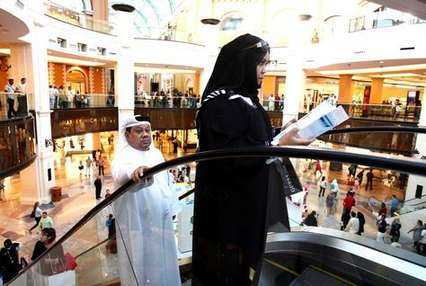在嚴(yán)格遵守男女隔離政策的沙特阿拉伯,女性是不允許在公共場(chǎng)合工作的。因此,連女性?xún)?nèi)衣店的店員都基本是男性。這讓很多女性消費(fèi)者頗為尷尬,同時(shí)要求改革的呼聲也日益高漲。為了改變這一狀況,沙特阿拉伯勞工部曾兩次頒布法令要求該行業(yè)雇傭女性店員,但執(zhí)行者寥寥。近日,沙特勞工部再發(fā)通告,要求所有女性?xún)?nèi)衣店在6個(gè)月內(nèi)將所有男店員換為女店員,逾期未執(zhí)行者,其內(nèi)衣店將被強(qiáng)行關(guān)閉。據(jù)悉,雇傭女性店員的內(nèi)衣店要承擔(dān)店員的培訓(xùn)費(fèi);同時(shí)還需遮蔽店內(nèi)的所有櫥窗以防止有人從外面窺視;另外還需雇傭一名男性門(mén)衛(wèi)在門(mén)口值守,阻止男性進(jìn)入內(nèi)衣店。很多內(nèi)衣店遲遲不肯執(zhí)行就是因?yàn)楣蛡蚺陠T不但會(huì)增加其運(yùn)營(yíng)成本,還會(huì)面臨銷(xiāo)售額下滑的局面。

 |
|
Women in Saudi Arabia, one of the world's most conservative societies, still have to buy their intimate clothing from male clerks, despite several petitions and two government decrees ordering businesses to hire women. |
Saudi lingerie stores are dragging their feet on an official deadline to avoid embarrassing female shoppers by replacing their male sales clerks with women, saying the change will create staff problems, lose them customers and cost them money.
Women in Saudi Arabia, one of the world's most conservative societies, still have to buy their intimate clothing from male clerks, despite several petitions and two government decrees ordering businesses to hire women.
In an effort to enforce the regulations, the Labour Ministry threatened on July 11 to close any lingerie shops that failed to replace all male staff within six months.
"We read about the order in newspapers but we did not receive any instructions (from management)... This plan can work but not at the speed they are expecting. The women have to be trained from scratch," said Tarek, a store manager at a lingerie shop in Jeddah.
In Saudi Arabia's conservative society, where religious police patrol the streets to enforce segregation of the sexes, women are not allowed to work in public places where they have contact with men, such as sale clerks or cashiers.
Shops that hire females must bear the cost of training them, cover their display windows to block the view into the stores and hire a male security guard, for at least 3,500 riyals ($930) a month, during work hours to keep men from entering.
One of Saudi Arabia's leading lingerie brands, Nayomi, made the switch after the first government decree was issued in 2004, staffing their 45 stores with female clerks only to revert to male employees a year later.
"In 2004, we implemented the order and hired women ... we faced a lot of problems," said a manager at Nayomi, who asked not to be identified. "The experience lasted about a year and we lost a lot of money, over 10 million riyals."
Poor sales owing to a lack of male customers, the high cost of ensuring security, the inability to lure customers with a window display and the reluctance of some women employees to work late shifts in a country where shops stay open until 11 pm led to the losses.
The Nayomi manager estimated that a switch to women only staff now would cost over 2 million riyals.
Pressure to hire women is driven by growing unemployment among the 18 million Saudis. Unemployment reached 10 percent in 2010 but for women the rate is estimated around 28 percent.
While many lingerie shops are not taking the threat too seriously, a small number have begun preparations.
The Fawaz Abdulaziz Al Hokair Group, which has 400 male employees in its three lingerie brands throughout the kingdom, has started training 200 females to take over their stores soon.
"We have joined with a private company to train the women. There are no trained women here because they did not work in that field before," said Ahmad Sheikh El Shabab, brand manager of La Senza, one of Al Hokair's lingerie brands in Saudi Arabia.
"The decision is great because worldwide the lingerie shops are managed by women, and that is how it should be especially in this conservative country. Many women get embarrassed buying these things from men," he said.
相關(guān)閱讀
英國(guó):女士只穿內(nèi)衣購(gòu)物贈(zèng)禮券
(Agencies)

(中國(guó)日?qǐng)?bào)網(wǎng)英語(yǔ)點(diǎn)津 Helen )
